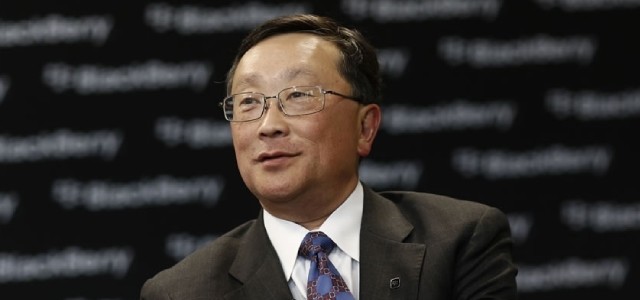BlackBerry CEO John Chen has always had a fairly honest approach to discussing the company at which he took over the job last year. True to form, his most recent comments haven't exactly sugar-coated the state of BlackBerry, but he insists that we shouldn't be writing any eulogies for its decease just yet.
With industry analysts IDC predicting that BlackBerry shipments will fall by over 50% this year, with its global share of the smartphone market dropping to just 0.8% by the end of 2014, things aren't looking terribly rosy at the Canadian company. That's an uncomfortable reality to face, and it seems to be one that Chen fully appreciates.

As Re/Code reports, BlackBerry's CEO said at the ongoing Code Conference that he sees significant value for shareholders in continuing to produce its own hardware, but he admitted that he "isn't emotionally tied" to that side of the business. Could the company ditch its devices business then, as some have predicted? He denied any plans to do so back in April, but it seems inevitable that that decision will ultimately come down to harsh business realities i.e. selling BlackBerry handsets - a task that it is finding increasingly challenging.
One problem that the company faces (and a problem that its rival Microsoft continues to face with Windows Phone, too) is that of its software ecosystem. Customers expect to find the same apps that are available on rival platforms, and fulfilling that expectation requires a rich and diverse developer community to build that software. Chen admitted that BlackBerry is no longer in a position to compete effectively with its rivals for developer mindshare.

With fewer developers creating apps for the platform, that leaves the company increasingly reliant on Android to flesh out its software ecosystem. BlackBerry 10 allows Android apps to run on devices through an emulator, currently based on the Android 4.2.2 Jelly Bean runtime. However, while the overwhelming majority of these apps can run on BB10 unaltered, they must be adapted if developers want to hook into OS-specific features, like the BlackBerry Hub.
Could BlackBerry 10 offer more extensive Android support in the future, as a possible solution to its software problem? Chen wouldn't commit to that, but he didn't rule it out either. Back in February, BlackBerry's Chris Smith told PCMag that the company might establish closer relationships with Android app stores, so a greater reliance on Android to fill in the app-gaps on its own platform certainly seems possible.
One of Chen's more candid - and rather astonishing - comments was his admission that he is perhaps not the best person to be running the company. Nilay Patel from Vox tweeted what Chen said:
Jessica Guynn from The Huffington Post added a further quote from Chen regarding his position:
There's honest, and there's downright insanely honest, and Chen's comments on that front were perhaps verging on the latter, given the depth of BlackBerry's woes. But regardless of how Chen ended up in the top job at the company, he's there now, for better or worse, and he believes that BlackBerry still has some life left in it. "We have a lot of problems," he said, "but [we're] not dead." It's not the first time we've heard that, of course - an unhappy indicator of the company's continuing struggles.
While its difficulties in the handset business continue, Chen said that there is still considerable scope to leverage the company's expertise in the enterprise space, and to build on its reputation for security. The nascent Internet of Things market is another area in which BlackBerry hopes that it can compete effectively, along with embedded systems such as those used in the automotive industry.
The company may be down, but as far as Chen is concerned, it's not out: "I am not, by any shape of the imagination... giving up yet," he said. But will he be able to cure BlackBerry of its ills? Chen certainly thinks so: "I am quite confident that we'll be able to save the patient."
Of course, it's one thing to save the patient, and another to restore the patient back to good health. That, unfortunately, is a far greater challenge.
Source Re/Code 1 / 2 | top image via CNN Mexico















25 Comments - Add comment